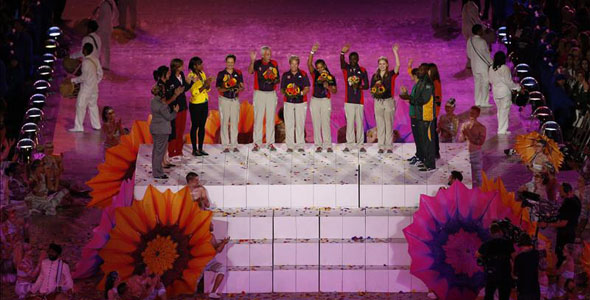London 2012 and the Great Olympic Race 10 Years on – Michael Pirrie
July 6, 2015

We will remember and rewind the stirring and uplifting speeches by Coe, reminding IOC members of their profound responsibility to select the bid city that will best advance the cause of Olympic Movement and mission and inspire more young people into sport, a central theme of the London bid; and others including Sir Craig Reedie, reassuring fellow IOC members that if they placed the Olympic spirit in London’s hands, we would guard it, cherish it and proudly hand it on.
I remember a group of female Bid members somewhat excitedly reassuring another Bid David ambassador, Beckham that they wouldn’t mind if he wanted to take off his shirt and put on a fresh one for the post vote press conference.
And I remember a senior member of the highly influential Olympic media group telling me that “we supported you and London because you always treated us with respect and gave us real stories. “
I also remember the excitement of working and dreaming with a Bid team from all sectors of society and professional backgrounds that we could bring the Games to London.
We all believed this was possible because of the outstanding leadership that kept everyone focussed and engaged at all times. Leaders like Coe, with his seriously funny, quirky sense of humour and unfailing graciousness and generosity of spirit that made everyone feel involved and part of the team; like Sir Keith Mills who would go the extra 10 miles every day never mind the extra yard or two to secure the Games.
And like the irrepressible Dame Tessa Jowell, the visionary and perennially optimistic Olympic bid minister who convinced British Prime Minister Tony Blair that the Games could be secured.
We will remember the global scrutiny of working on a project with almost zero margin for error, and living and working in a pressure bubble where the reputation of the bidding city and nation was on the line almost 24/7 at all stages of the lengthy bid campaign.
Ten years on, we will remember the legacies and lessons of the London Bid, which is now regarded as a blueprint for winning the most sought after event in world sport.

Looking back at my files and records, I can see that many factors were important and remain just as relevant for the Olympic 2022 and Olympic 2024 bid cities and cycles – from the need to ensure integrated thinking; develop a global election approach; build an inclusive bid organisation – one team; manage the highs and lows of the bid process and build momentum to addressing the negatives as soon as possible; change the way you communicate if its not working; build on your cultural, city and sporting strengths; communicate key messages tirelessly; understand the importance of the Application questionnaire, and the current priorities of the Olympic and Paralympic movements – for us at the time it was Legacy and the Pound Report while today its the Agenda 2020 reforms; demonstrate the enthusiasm of the city and country for the Games; have clear political unity; plan unique Games experience for client groups; demonstrate the strength of the bid team, and many others.
Above all, it is critical to understand that Why you are bidding is as important as How you will deliver the Games – that your Vision for the Games is as important as your technical and operational plan.
Communication is key to ensure the Games are wanted by the city and country. If not, don’t bid.
Never lose focus and never give up.
London showed for the first time that the Games vision drives everything and that communication must be at the heart of every bid to ensure that the vision is communicated to all the key stakeholders, especially so domestic communities understand from the outset of the bid process the benefits that the Games will bring, and so international sporting federations and national olympic committees understand the Games plan for the athletes.

And we will also remember the victims of the London bombings, and how the emotional journey between the bid and the bombings and the Games would reach an almost preordained conclusion when a volunteer approached Coe on a train towards the end of the Games in 2012 and said Thank You.
Confused, Coe said No, I should be thanking you for being one of our great volunteers. The Volunteer would not be denied, and said, No, I should be thanking you. I was on duty the day of the London bombings and I saw the worst in humanity. As a volunteer here at the London Olympics, I have seen the best in humanity!
 Michael Pirrie is a major events and communications strategist and advisor, who managed international communications and media relations and liaison with the IOC executive office on planning for the London 2012 Olympic Games.
Michael Pirrie is a major events and communications strategist and advisor, who managed international communications and media relations and liaison with the IOC executive office on planning for the London 2012 Olympic Games.
{jcomments on}



